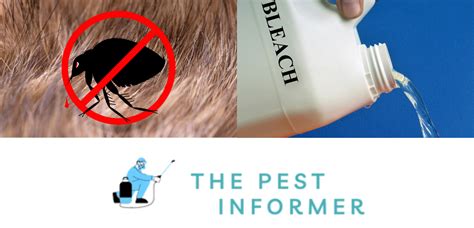Fleas can be a nuisance to both pets and their owners, causing discomfort, allergic reactions, and even transmitting diseases. When it comes to getting rid of these pesky parasites, many people turn to various methods, including using bleach. But does bleach really kill fleas and their eggs effectively?
First, let's understand the life cycle of fleas. Fleas have four stages of development: eggs, larvae, pupae, and adult fleas. Adult fleas lay eggs on their host, which then fall off and hatch into larvae. The larvae spin a cocoon and enter the pupal stage, eventually emerging as adult fleas. To effectively get rid of fleas, it's essential to target all stages of their life cycle.
Can Bleach Kill Fleas?
Bleach is a strong disinfectant that can kill fleas, but its effectiveness depends on various factors. When used correctly, bleach can kill adult fleas and their larvae. However, it's essential to note that bleach is not a reliable method for killing flea eggs.
Why Bleach Fails to Kill Flea Eggs
Flea eggs are designed to be resilient and can withstand extreme temperatures, drying, and even some chemicals. Bleach, in particular, may not penetrate the eggshell effectively, allowing the eggs to survive. Additionally, flea eggs can be found in various environments, such as carpets, upholstery, and pet bedding, making it challenging to ensure that all eggs are exposed to the bleach.
How to Use Bleach to Kill Fleas
If you still want to use bleach to kill fleas, here are some tips:
- Mix 1 part bleach with 10 parts water.
- Apply the solution to surfaces where fleas are present, such as pet bedding, carpets, and upholstery.
- Let the solution sit for 10-15 minutes to allow the bleach to penetrate and kill the fleas.
- Rinse the surfaces thoroughly with clean water to remove any remaining bleach residue.
Alternatives to Bleach for Killing Fleas
While bleach can be used to kill fleas, there are more effective and safer alternatives available. Some of these alternatives include:
- Flea sprays: These are specifically designed to kill fleas and their eggs. Look for sprays that contain ingredients like pyrethrin, permethrin, or fipronil.
- Flea powders: These can be used to kill fleas and their eggs on carpets, upholstery, and pet bedding.
- Flea shampoos: These can be used to kill fleas on your pet's body.
- Flea preventatives: These are medications that can be given to your pet to prevent flea infestations.
Tips for Getting Rid of Fleas
Getting rid of fleas requires a comprehensive approach. Here are some additional tips:
- Wash and dry: Wash and dry your pet's bedding, blankets, and any other washable items that may have come into contact with fleas.
- Vacuum: Vacuum all surfaces, especially carpets and upholstery, to remove flea eggs, larvae, and adult fleas.
- Mop: Mop hard floors with a gentle detergent to remove flea eggs and larvae.
- Treat your pet: Use a flea preventative medication on your pet to kill fleas and prevent re-infestation.

Conclusion
While bleach can be used to kill fleas, it's not the most effective method, especially when it comes to killing flea eggs. There are safer and more effective alternatives available, such as flea sprays, powders, shampoos, and preventatives. To get rid of fleas, it's essential to use a comprehensive approach that includes washing and drying, vacuuming, mopping, and treating your pet.






FAQ Section
Q: Can bleach kill flea eggs?
+A: No, bleach is not effective in killing flea eggs. Flea eggs are designed to be resilient and can withstand extreme temperatures, drying, and some chemicals.
Q: What are some effective alternatives to bleach for killing fleas?
+A: Some effective alternatives to bleach for killing fleas include flea sprays, powders, shampoos, and preventatives.
Q: How can I get rid of fleas completely?
+A: To get rid of fleas completely, use a comprehensive approach that includes washing and drying, vacuuming, mopping, and treating your pet with a flea preventative medication.
